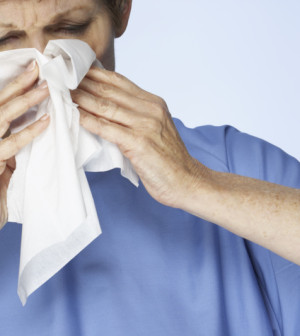- Planters Peanut Products Under Recall Due to Listeria Risk
- That ‘New Car Smell’ Could Be Toxic Carcinogens
- Gene Discovery Points to a New Form of Alzheimer’s
- Scientists May Have Located Your Brain’s ‘Neural Compass’
- Almost All Counterfeit Oxycontin Pills Contain Fentanyl
- A Parent’s Watchful Eye Does Keep Kids From Drugs, Alcohol: Study
- AI Might Boost Detection of A-Fib
- Drug May Help Folks Kick the Vaping Habit
- Small Pump May Let Kids Stay Home As They Await New Heart
- Gene Therapy Improves Vision in People With Inherited Blindness
Climate Change Will Boost Grass Pollen Production, Study Contends


Climate change will boost levels of grass pollen in the air in the next 100 years, resulting in increased misery for people with grass allergy, a new study contends.
Researchers predict that climate change-related rises in carbon dioxide will increase grass pollen production and people’s exposure to the pollen by up to 202 percent in the next 100 years.
“The implications of increasing CO2 for human health are clear. Stimulation of grass pollen production by elevated CO2 will increase airborne concentrations and increase exposure and suffering in grass pollen-allergic individuals,” wrote Christine Rogers and colleagues at the University of Massachusetts, Amherst School of Public Health and Health Sciences.
“This is the first evidence that pollen production is significantly stimulated by elevated carbon dioxide in a grass species and has worldwide implications due to the ubiquitous presence of grasses in all biomes and high prevalence of grass pollen allergy,” Rogers said in a university news release.
“These results are similar to our other studies performed in other highly allergenic taxa such as ragweed but with more extreme outcomes and wider impacts,” she added.
The study was published Nov. 5 in the journal PLoS One.
More information
The U.S. National Library of Medicine has more about grass allergy.
Source: HealthDay
Copyright © 2024 HealthDay. All rights reserved.










